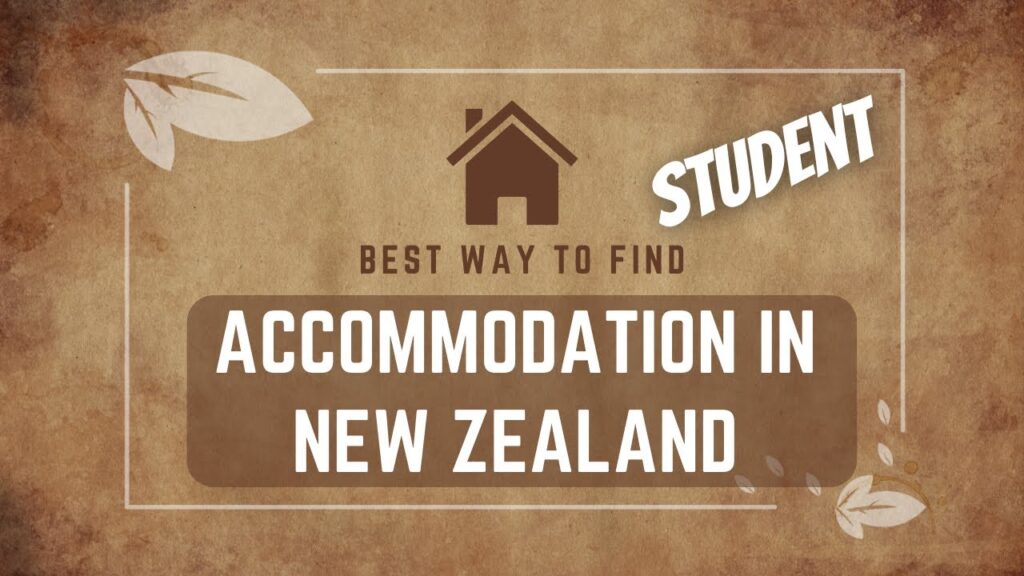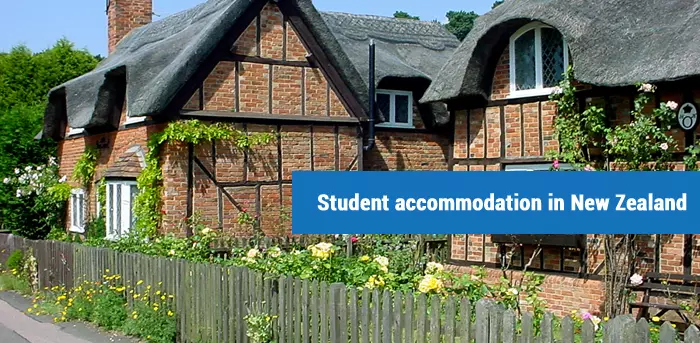When it comes to pursuing higher education in New Zealand, one of the essential considerations is your accommodation.
The Land of the Long White Cloud offers a diverse range of student housing options, each with its own unique set of advantages and disadvantages.
In this post, i will explore the three primary types of student accommodation available in New Zealand, helping you make an informed decision that aligns with your individual needs and preferences.

ALSO SEE:
15 top universities in New Zealand
Top Universities in New Zealand for International Students – Rankings
Top Best Ways to Make Money Online as a Student in the USA
The Benefits of Renewable Energy Sources
Quick Ways To Make Money As A Student In USA
Halls of Residence
Convenient Location
Halls of Residence, often referred to as “halls,” are on-campus accommodation options primarily owned and operated by the university.
They are strategically located within the university campus, offering unparalleled proximity to your classes and other university facilities. This convenience can save you valuable time and ensure that you’re never far from the academic action.
Social Atmosphere
One of the major benefits of living in a hall of residence is the social atmosphere it fosters. Halls provide an excellent opportunity to meet other students, make new friends, and engage in a vibrant, close-knit community. The shared common areas are perfect for socializing and studying, enhancing your overall university experience.
Meal Plans
Many halls of residence offer meal plans, relieving you of the burden of cooking and cleaning up. This not only saves time but also ensures that you have access to regular, nutritious meals, a crucial factor in maintaining a healthy and balanced student life.
Support Services
Halls of residence often have dedicated staff on hand to provide support and assistance to students. Whether you need academic guidance or personal support, you can count on the resources available within the hall to help you navigate the challenges of university life.
Cons of Halls of Residence
- Cost: Halls of residence can be more expensive compared to other types of student accommodation.
- Limited Privacy: Sharing a room means giving up some privacy.
- Noise: Halls of residence can be noisy, particularly during nighttime hours.
Homestay
Cultural Experience
A homestay is a unique accommodation arrangement where you live with a New Zealand family. It offers an unparalleled opportunity to immerse yourself in New Zealand culture and gain insights into the local way of life. Homestay families provide students with a room, meals, and often other services such as laundry and transportation.
Support from a Family
Living with a local family can be reassuring, especially if you’re new to the country. Homestay families can provide valuable support and guidance, making your transition to a new environment more comfortable and enjoyable.
Home-Cooked Meals
One of the highlights of a homestay is the delicious home-cooked meals prepared by your host family. This not only provides a taste of New Zealand cuisine but also ensures you’re well-nourished during your academic journey.
Cons of Homestay
- Less Independence: You’ll need to follow the rules of your host family, which may limit your independence.
- Less Privacy: Living with a family means sharing your living space.
- Cost: Homestay can be more expensive compared to other student accommodation options.
Flatting
More Independence and Privacy
Flatting, a common term in New Zealand, refers to renting a shared house or apartment with other students. If you value independence and privacy, this may be the perfect choice for you. Unlike halls of residence and homestays, flatting offers a greater degree of autonomy.
More Affordable
Flatting is typically more affordable than other accommodation options. It allows you to manage your budget more effectively, giving you financial flexibility during your studies.
Flexibility
In a flatting situation, you have the flexibility to choose flatmates who share your interests and lifestyle, creating a comfortable and harmonious living environment.
Cons of Flatting
- More Responsibility: You’ll be responsible for sharing household chores and bills with your flatmates.
- Finding Flatmates: Finding compatible flatmates can be challenging, especially if you’re new to New Zealand.
How much is student accommodation in New Zealand?
When planning your academic journey in New Zealand, it’s crucial to have a clear understanding of the costs associated with student accommodation.
The expenses can vary widely depending on the type of accommodation, its location, and the time of year.
To help you budget effectively, here’s a general guide to the costs of student accommodation in New Zealand.
Average Annual Costs
As a general rule of thumb, you can anticipate spending between NZ$15,000 and NZ$18,000 per year for student accommodation. Keep in mind that these figures are averages, and the actual costs can fluctuate based on your unique circumstances.
Halls of Residence
Halls of residence, often situated on or near the university campus, offer the convenience of proximity to academic facilities.
Here’s an estimate of the weekly costs:
- Low-End Range: Approximately NZ$300 per week
- High-End Range: Around NZ$400 per week
The pricing range within halls of residence can vary depending on factors such as room type, included services, and location.
Homestay
Living with a local New Zealand family provides a unique cultural experience. Homestay costs can fluctuate based on the services offered by the host family.
Here’s an estimate of the weekly costs:
- Low-End Range: Starting at approximately NZ$110 per week
- High-End Range: Up to NZ$370 per week
The pricing of homestay accommodations is influenced by factors like meal plans and additional services like laundry and transportation.
Flats
Renting a shared house or apartment with other students, commonly referred to as flatting, tends to be a more cost-effective option.
Here’s an estimate of the weekly costs for flats:
- Approximately: NZ$215 per week
Flatting offers greater independence, and the cost is relatively stable compared to other accommodation options.
It’s essential to recognize that these figures serve as general guidelines. The actual cost of your student accommodation in New Zealand can vary based on your specific situation. Factors that may affect the final cost include the city or region where you choose to study, the condition and location of the accommodation, and any additional services or amenities provided.
Before making a decision, it’s advisable to research the specific accommodation options available to you, compare costs, and consider your budget carefully.
By doing so, you can ensure that your accommodation choice aligns with your financial plan while offering a comfortable and enjoyable living experience during your academic journey in New Zealand.
How many student accommodations are there?

When it comes to studying abroad in New Zealand, one of the essential aspects that students need to consider is finding suitable accommodation.
The availability and quality of student accommodations can greatly impact the overall experience of international students.
In this section, I will look into the world of student housing in New Zealand, providing insights into the options available, their pros and cons, and essential tips for securing the best place to live during your educational journey.
The Current Landscape
The number of student accommodations in New Zealand is subject to constant change due to the evolving demands of international and domestic students.
According to Student Housing New Zealand, a prominent organization specializing in student accommodation, there are currently over 100,000 student accommodation beds available in the country.
These accommodations come in various forms, including university-owned residences, private apartments, homestays, and more.
Types of Student Accommodations
1. University-Owned Accommodations
One of the most popular options for international students is university-owned accommodations. These are typically located on or near the university campus, offering convenience and a strong sense of community.
The advantages of university-owned accommodations include:
- Proximity: Being close to campus can save you time and money on transportation.
- Academic Support: These accommodations often provide academic support services.
- Social Opportunities: You’ll have plenty of opportunities to make friends and connect with fellow students.
However, the demand for university-owned accommodations can be high, and they may have limited spaces, so it’s crucial to apply early.
2. Private Apartments and Flats
If you prefer more independence and privacy, private apartments and flats are a great choice. These can be found both near universities and in various urban areas.
Here’s what you need to know:
- Independence: You’ll have your space and can set your own rules.
- Variety: There are many options to choose from, catering to different budgets.
- Responsibilities: You’ll need to manage utilities, groceries, and other household expenses.
Private accommodations offer flexibility, but you should start your search well in advance to secure the best deals.
3. Homestays
Living with a local family, or a homestay, can provide a unique cultural experience. This option is ideal for students who want to immerse themselves in Kiwi culture.
Benefits of homestays include:
- Cultural Immersion: You’ll get a taste of New Zealand’s way of life and traditions.
- Supportive Environment: Homestay families often provide guidance and support.
- Meals Included: Many homestays include meals, reducing your living costs.
It’s essential to choose your homestay carefully to ensure a compatible living environment.
Choosing the Right Accommodation
Selecting the right student accommodation is a crucial decision. To make an informed choice, consider the following factors:
1. Budget
Your budget is a significant factor in determining your accommodation options. Calculate your monthly expenses, including rent, utilities, and groceries, and choose accommodation that fits your budget without compromising your living standards.
2. Location
Consider the location of your accommodation concerning your university. A closer location can save you time and money on commuting, while a more central location may provide easier access to amenities and entertainment.
3. Lifestyle
Think about your preferred lifestyle. If you value independence and privacy, a private apartment may be the best fit. If you’re looking for a supportive and culturally enriching experience, a homestay may be ideal.
4. Availability
Start your accommodation search early, as the best options tend to get booked quickly. Reach out to your university’s housing services or utilize online platforms to secure your spot.
What accommodations are available for international students in New Zealand?

Studying in New Zealand is an exciting adventure, but finding the right place to live is a crucial aspect of your journey. As an international student, you have several accommodation options to choose from, each with its own set of advantages and disadvantages.
In this section, I’ll walk you through the various types of student accommodations available in New Zealand, helping you make an informed decision about where to call home during your educational pursuit.
On-Campus Accommodation
Pros:
- Convenient Location: On-campus accommodations are typically situated near classrooms, libraries, and other university facilities, making it easy to access your academic resources.
- Social Atmosphere: Living on campus provides an excellent opportunity to meet fellow students and build lasting friendships, fostering a strong sense of community.
- Meal Plans: Many on-campus accommodations offer meal plans, relieving you from the hassles of cooking and cleaning up.
- Support Services: On-campus accommodations often have dedicated staff to provide support and assistance to students, creating a supportive environment.
Cons:
- Cost: On-campus accommodation can be relatively more expensive than other student housing options.
- Limited Privacy: If you opt for a shared room, you might need to compromise on some degree of privacy.
- Noise: On-campus accommodations can sometimes be noisy, especially during the night.
Homestay
Pros:
- Cultural Experience: Homestay allows you to immerse yourself in New Zealand culture and gain insight into the local way of life.
- Support from a Family: Homestay families offer support and guidance to their students, ensuring a smooth transition into the new environment.
- Home-Cooked Meals: Enjoy delicious home-cooked meals prepared by your homestay family, making your stay even more comfortable.
Cons:
- Less Independence: In a homestay, you’ll need to follow the rules and guidelines set by your host family, which may limit your independence.
- Reduced Privacy: Sharing living space with your homestay family means you’ll have less privacy compared to other accommodation options.
- Cost: Homestay can be pricier than some other forms of student housing.
Private Rental
Pros:
- More Independence and Privacy: Private rental accommodations offer a higher degree of independence and privacy, allowing you to set your own rules and routines.
- Affordability: Private rentals can be more budget-friendly than on-campus or homestay options.
- Flexibility: You have the freedom to choose between a room or an entire apartment and select a location that suits your preferences.
Cons:
- Additional Responsibilities: Rent, bills, and maintenance of your accommodation will be your responsibility, requiring you to manage these aspects independently.
- Finding Accommodation: It can sometimes be challenging to find private rental accommodation, especially at the beginning of the semester.
Student Villages
Pros:
- Convenient Location: Student villages are often strategically located near campuses and other essential amenities, reducing commute times.
- Social Atmosphere: These accommodations offer various social activities and events, providing ample opportunities to connect with fellow students and build a social network.
- Facilities: Student villages typically boast a range of facilities, including swimming pools, gyms, and common areas for socializing and studying.
Cons:
- Cost: Student villages may come at a higher price point compared to other student accommodation options.
- Limited Availability: Due to their popularity, securing accommodation in student villages requires early booking.
The right choice of accommodation depends on your individual needs and preferences. If you seek convenience and a vibrant social environment, on-campus accommodation or student villages might be your best bet.
For those keen on experiencing Kiwi culture and living with a local family, homestay is an excellent option. And if you value independence and privacy, private rentals provide the flexibility you need.
Remember that your choice of accommodation can significantly influence your overall experience in New Zealand, so take the time to explore your options and make the decision that aligns with your goals and lifestyle.
Conclusion
The choice of student accommodation in New Zealand ultimately depends on your individual needs and preferences.
If you’re seeking convenience and a vibrant social atmosphere, halls of residence may be the ideal fit.
For those interested in immersing themselves in New Zealand culture and living with a local family, homestay is a compelling option.
However, if independence and affordability are your top priorities, flatting offers a more autonomous living experience.
It’s essential to weigh the pros and cons of each accommodation type and consider your personal preferences to make the right decision.
By doing so, you’ll ensure that your living arrangements enhance your overall academic experience in beautiful New Zealand.






